Module 4 Life in the future Unit 3 Language in use课件32张
文档属性
| 名称 | Module 4 Life in the future Unit 3 Language in use课件32张 |
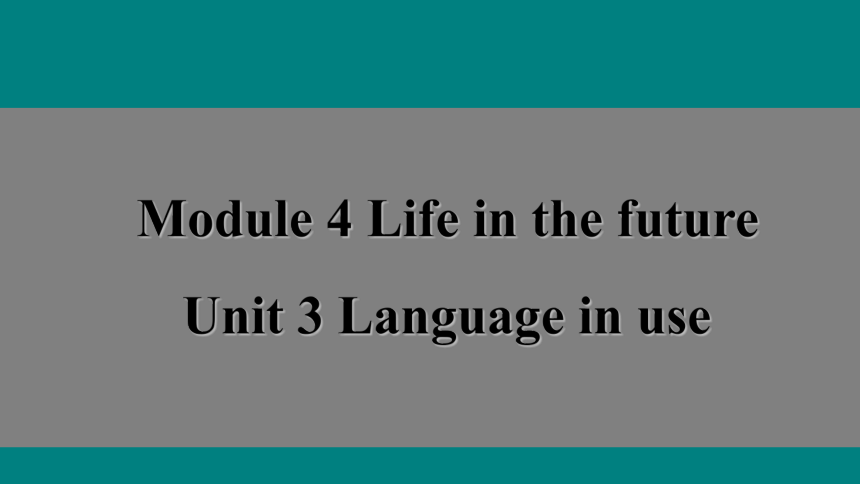
|
|
| 格式 | pptx | ||
| 文件大小 | 3.4MB | ||
| 资源类型 | 教案 | ||
| 版本资源 | 外研版 | ||
| 科目 | 英语 | ||
| 更新时间 | 2021-12-12 11:04:43 | ||
图片预览

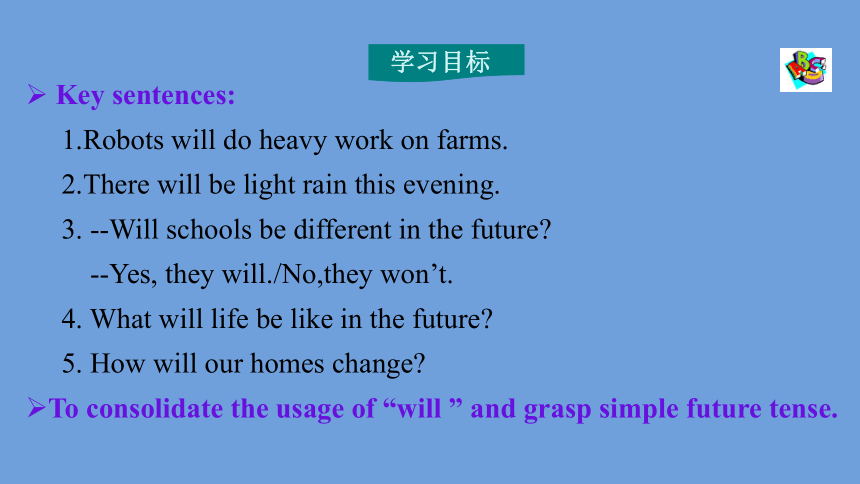
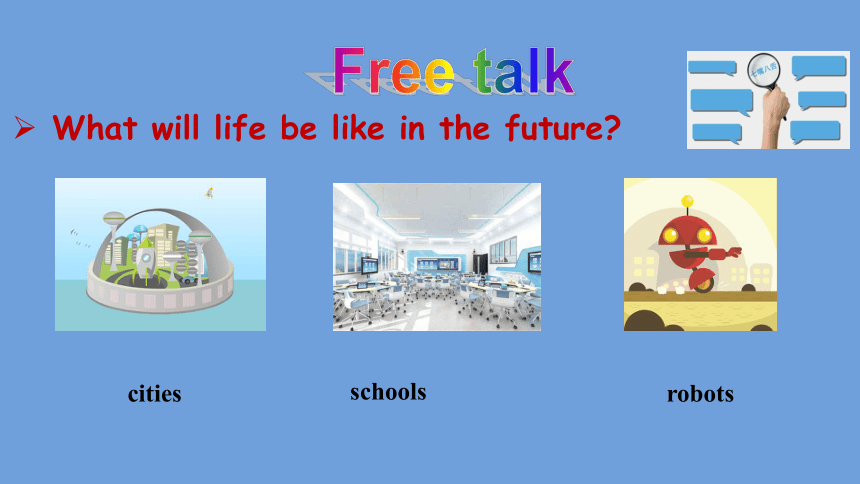
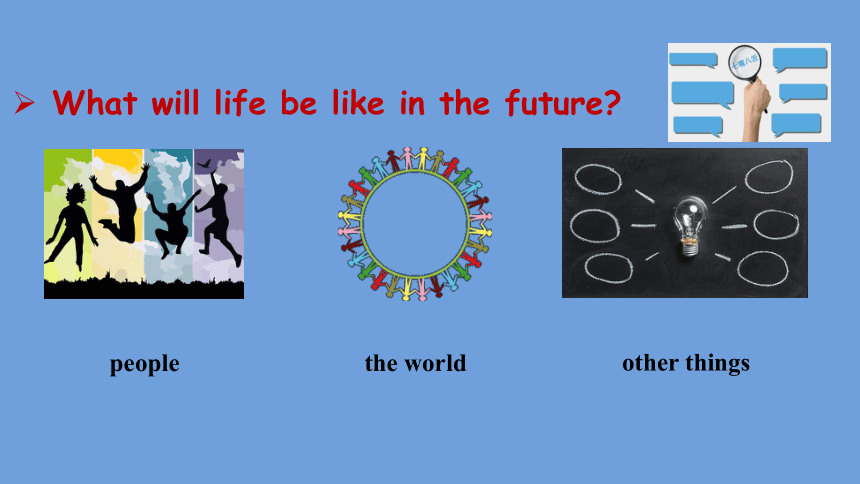
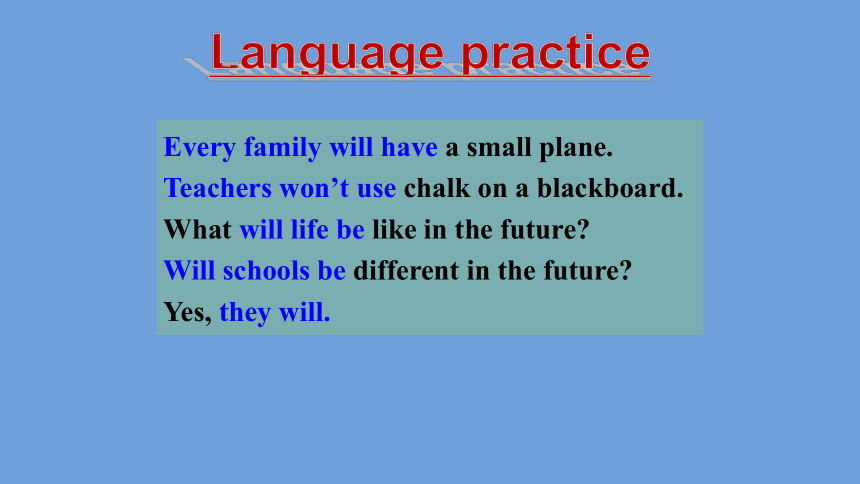
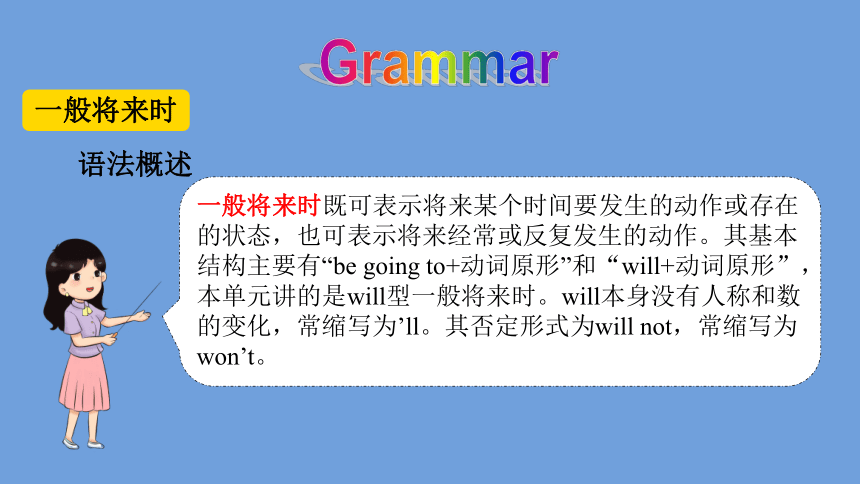
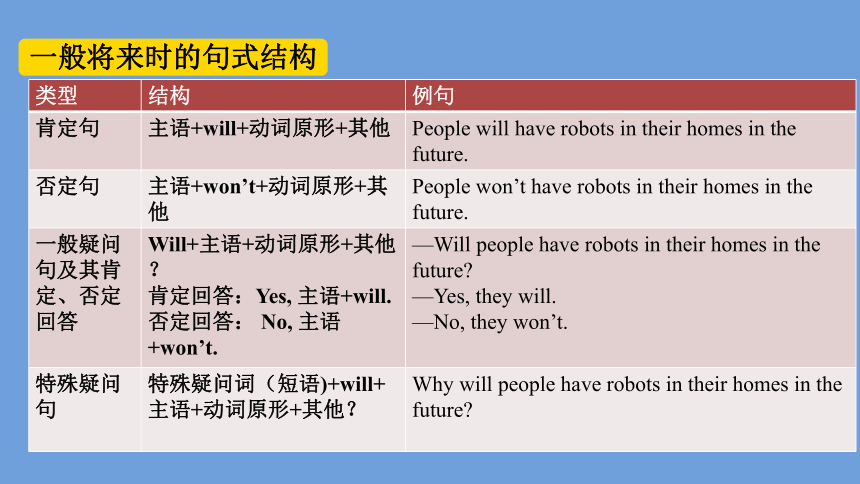
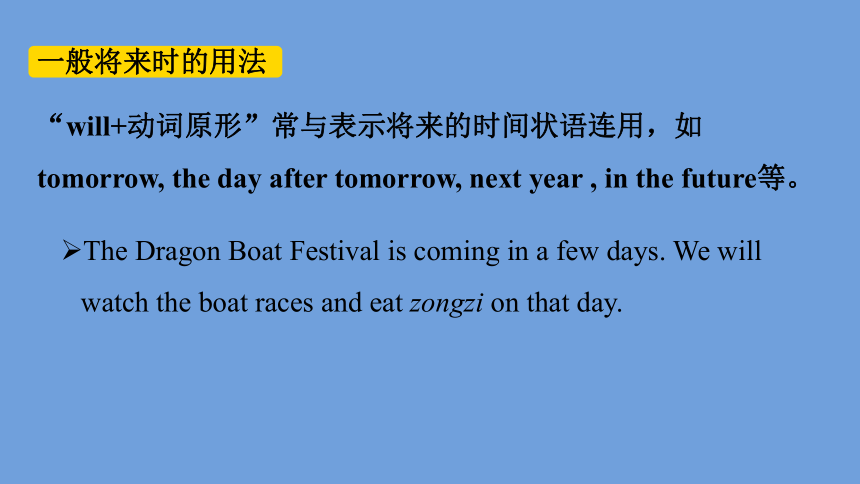
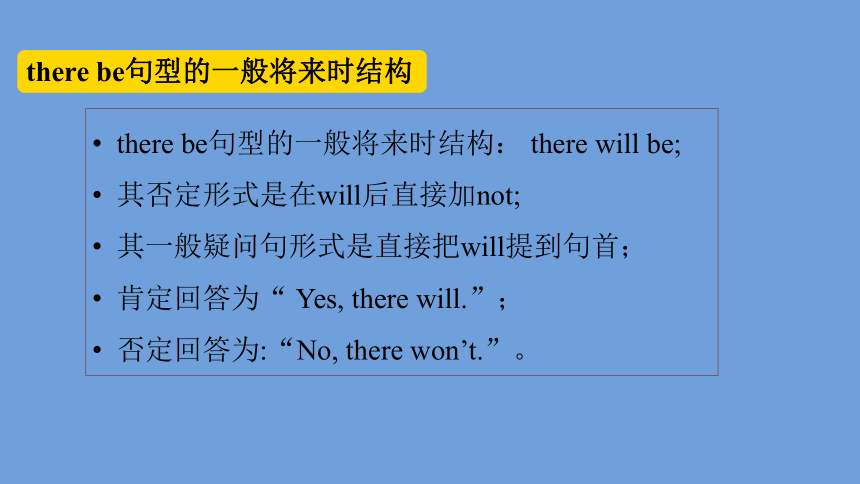
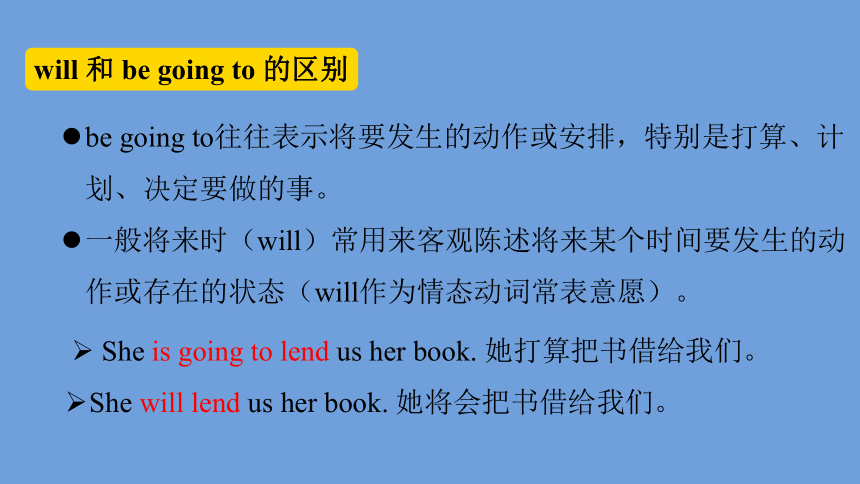
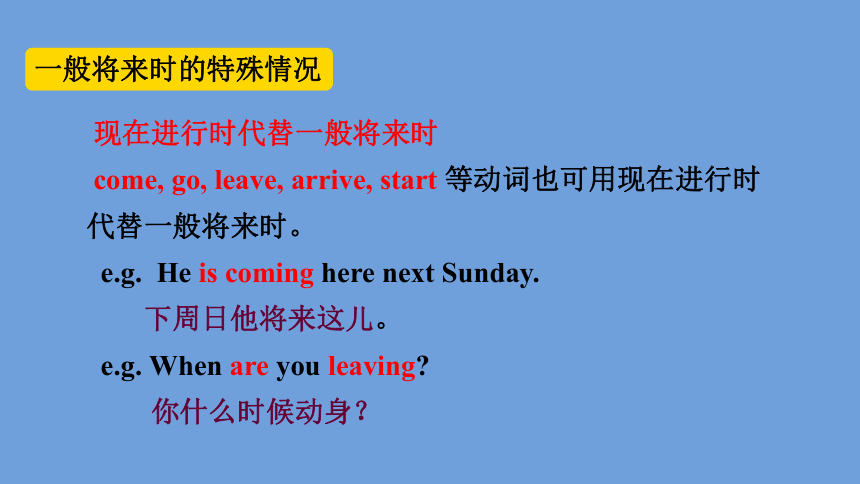
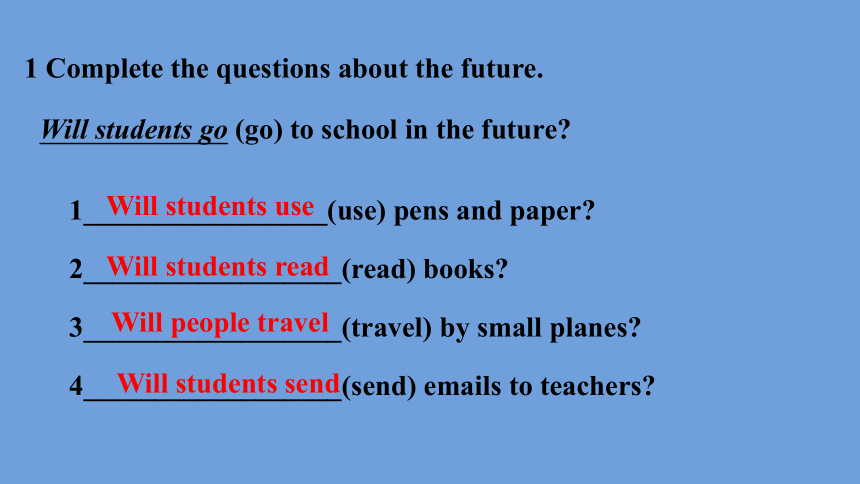
文档简介
(共32张PPT)
Module 4 Life in the future
Unit 3 Language in use
学习目标
Key sentences:
1.Robots will do heavy work on farms.
2.There will be light rain this evening.
3. --Will schools be different in the future
--Yes, they will./No,they won’t.
4. What will life be like in the future
5. How will our homes change
To consolidate the usage of “will ” and grasp simple future tense.
Free talk
What will life be like in the future
cities
robots
schools
the world
people
other things
What will life be like in the future
Language practice
Every family will have a small plane.
Teachers won’t use chalk on a blackboard.
What will life be like in the future
Will schools be different in the future
Yes, they will.
Grammar
一般将来时
一般将来时既可表示将来某个时间要发生的动作或存在的状态,也可表示将来经常或反复发生的动作。其基本结构主要有“be going to+动词原形”和“will+动词原形”,本单元讲的是will型一般将来时。will本身没有人称和数的变化,常缩写为’ll。其否定形式为will not,常缩写为won’t。
语法概述
一般将来时的句式结构
类型 结构 例句
肯定句 主语+will+动词原形+其他 People will have robots in their homes in the future.
否定句 主语+won’t+动词原形+其他 People won’t have robots in their homes in the future.
一般疑问句及其肯定、否定回答 Will+主语+动词原形+其他? 肯定回答:Yes, 主语+will. 否定回答: No, 主语+won’t. —Will people have robots in their homes in the future
—Yes, they will.
—No, they won’t.
特殊疑问句 特殊疑问词(短语)+will+ 主语+动词原形+其他? Why will people have robots in their homes in the future
一般将来时的用法
“will+动词原形”常与表示将来的时间状语连用,如tomorrow, the day after tomorrow, next year , in the future等。
The Dragon Boat Festival is coming in a few days. We will watch the boat races and eat zongzi on that day.
there be句型的一般将来时结构
there be句型的一般将来时结构: there will be;
其否定形式是在will后直接加not;
其一般疑问句形式是直接把will提到句首;
肯定回答为“ Yes, there will.”;
否定回答为:“No, there won’t.”。
be going to往往表示将要发生的动作或安排,特别是打算、计划、决定要做的事。
一般将来时(will)常用来客观陈述将来某个时间要发生的动作或存在的状态(will作为情态动词常表意愿)。
She is going to lend us her book. 她打算把书借给我们。
She will lend us her book. 她将会把书借给我们。
will 和 be going to 的区别
一般将来时的特殊情况
现在进行时代替一般将来时
come, go, leave, arrive, start 等动词也可用现在进行时代替一般将来时。
e.g. He is coming here next Sunday.
下周日他将来这儿。
e.g. When are you leaving
你什么时候动身?
1 Complete the questions about the future.
Will students go (go) to school in the future
1_________________(use) pens and paper
2__________________(read) books
3__________________(travel) by small planes
4__________________(send) emails to teachers
Will students use
Will students read
Will people travel
Will students send
2 Work in pairs. Ask and answer the questions in Activity 1.
--Will students go to school in the future
--Yes, they will./ No, they won’t. They’ll study at home.
--Will students send emails to teachers
--Yes, they will./ No, they won’t.
3 Put the words in brackets in the correct place in the sentences.
They’ll have a lot of time! (free)
They’ll have a lot of free time!
1. People won’t have any jobs. (difficult)
2. Robots will do work farms. (heavy)
3. People will have holidays. (long)
4. There will be rain this evening. (light)
Answers:
1. People won’t have any difficult jobs.
2. Robots will do heavy work farms.
3. People will have long holidays.
4. There will be light rain this evening.
4 Put the words and expressions from the box into the correct column.
email heavy rain heavy work hot summer interesting job
Internet small plane traffic jam warm winter wind
Weather Computer Job Travel
heavy rain
hot summer
warm winter
wind
email
Internet
heavy work
interesting
job
small plane
traffic jam
Around the world
Robots in Japan
Japan has many robots now and you
can see lots of them in the country.
You can find worker robots, robots
that clean your home, and even
robots you can play with.
Free talk
Do you know anything about robots
What do they look like
What can they do
What do you think of robots
What do these robots look like
They look like humans.
What do these robots look like
kangaroo
snake
cat
dog
They look like all kinds of animals.
What do these robots look like
They look like huge arms.
What can robots do
speak
do exercise
play football
dance
They can do the same things as humans do.
What can robots do
help with the housework
play the piano
make cars
They can help people in many ways.
Module task: Making a poster about life in the future in your home town
5. Think about life in the future. Write down your ideas.
School
Home
Travel
Weather
Schools will be different in the future.
There wil be robots at home.
People will travel in small planes.
The weather will be quite warm or even hot all year.
6 Work in groups of four. Talk about your ideas. Describe on five good ideas.
A: What will school be like in the future
B: The teacher won’t write on a blackboard…
C: How will our homes change
D: There will be more machines…
A: Will we find new ways to travel
B: Yes, we will. we’ll…
C: Will the weather change
D: Yes, it will. It will be…
7 Make a poster. Include five of your good ideas .
Everyone will have a small car.
Teachers won’t write on a blackboard with chalk.
Homes will be cool in summer.
There will be heavy rain and strong winds.
… will …
Life in the future
Life in the future will be very different. We’ll have robots to do everything. They will cook ,clean the house and drive buses. People
will travel by plane a lot. Children will have a lot of free time.
At school, we won’t have books or pens, and we won’t have teachers. We will learn from robots and Internet .Working hours will be short. And people will have long holidays.
In the future, the weather will be change. It will be very hot there will be more rain. Life in the future will be very interesting.
Exercises
一、单项选择
( )1. ________ you ________ free next
Sunday
A. Will; are B. Will; be C. Do; be D. Are; be
( ) 2. There __________ a meeting tomorrow afternoon.
A. will be going to B. will going to be
C. is going to be D. will go to be
B
C
( ) 3. He ________ very busy this week, and he ________ free next week.
A. will be; is B. is; is C. will be; will be D. is; will be
( ) 4. Charlie ________ here next month.
A. isn’t working B. doesn’t working
C. isn’t going to working D. won’t work
D
D
Homework
Preview Module 5 Unit 1.
Do the exercises in students’ book.
Thank you!
Module 4 Life in the future
Unit 3 Language in use
学习目标
Key sentences:
1.Robots will do heavy work on farms.
2.There will be light rain this evening.
3. --Will schools be different in the future
--Yes, they will./No,they won’t.
4. What will life be like in the future
5. How will our homes change
To consolidate the usage of “will ” and grasp simple future tense.
Free talk
What will life be like in the future
cities
robots
schools
the world
people
other things
What will life be like in the future
Language practice
Every family will have a small plane.
Teachers won’t use chalk on a blackboard.
What will life be like in the future
Will schools be different in the future
Yes, they will.
Grammar
一般将来时
一般将来时既可表示将来某个时间要发生的动作或存在的状态,也可表示将来经常或反复发生的动作。其基本结构主要有“be going to+动词原形”和“will+动词原形”,本单元讲的是will型一般将来时。will本身没有人称和数的变化,常缩写为’ll。其否定形式为will not,常缩写为won’t。
语法概述
一般将来时的句式结构
类型 结构 例句
肯定句 主语+will+动词原形+其他 People will have robots in their homes in the future.
否定句 主语+won’t+动词原形+其他 People won’t have robots in their homes in the future.
一般疑问句及其肯定、否定回答 Will+主语+动词原形+其他? 肯定回答:Yes, 主语+will. 否定回答: No, 主语+won’t. —Will people have robots in their homes in the future
—Yes, they will.
—No, they won’t.
特殊疑问句 特殊疑问词(短语)+will+ 主语+动词原形+其他? Why will people have robots in their homes in the future
一般将来时的用法
“will+动词原形”常与表示将来的时间状语连用,如tomorrow, the day after tomorrow, next year , in the future等。
The Dragon Boat Festival is coming in a few days. We will watch the boat races and eat zongzi on that day.
there be句型的一般将来时结构
there be句型的一般将来时结构: there will be;
其否定形式是在will后直接加not;
其一般疑问句形式是直接把will提到句首;
肯定回答为“ Yes, there will.”;
否定回答为:“No, there won’t.”。
be going to往往表示将要发生的动作或安排,特别是打算、计划、决定要做的事。
一般将来时(will)常用来客观陈述将来某个时间要发生的动作或存在的状态(will作为情态动词常表意愿)。
She is going to lend us her book. 她打算把书借给我们。
She will lend us her book. 她将会把书借给我们。
will 和 be going to 的区别
一般将来时的特殊情况
现在进行时代替一般将来时
come, go, leave, arrive, start 等动词也可用现在进行时代替一般将来时。
e.g. He is coming here next Sunday.
下周日他将来这儿。
e.g. When are you leaving
你什么时候动身?
1 Complete the questions about the future.
Will students go (go) to school in the future
1_________________(use) pens and paper
2__________________(read) books
3__________________(travel) by small planes
4__________________(send) emails to teachers
Will students use
Will students read
Will people travel
Will students send
2 Work in pairs. Ask and answer the questions in Activity 1.
--Will students go to school in the future
--Yes, they will./ No, they won’t. They’ll study at home.
--Will students send emails to teachers
--Yes, they will./ No, they won’t.
3 Put the words in brackets in the correct place in the sentences.
They’ll have a lot of time! (free)
They’ll have a lot of free time!
1. People won’t have any jobs. (difficult)
2. Robots will do work farms. (heavy)
3. People will have holidays. (long)
4. There will be rain this evening. (light)
Answers:
1. People won’t have any difficult jobs.
2. Robots will do heavy work farms.
3. People will have long holidays.
4. There will be light rain this evening.
4 Put the words and expressions from the box into the correct column.
email heavy rain heavy work hot summer interesting job
Internet small plane traffic jam warm winter wind
Weather Computer Job Travel
heavy rain
hot summer
warm winter
wind
Internet
heavy work
interesting
job
small plane
traffic jam
Around the world
Robots in Japan
Japan has many robots now and you
can see lots of them in the country.
You can find worker robots, robots
that clean your home, and even
robots you can play with.
Free talk
Do you know anything about robots
What do they look like
What can they do
What do you think of robots
What do these robots look like
They look like humans.
What do these robots look like
kangaroo
snake
cat
dog
They look like all kinds of animals.
What do these robots look like
They look like huge arms.
What can robots do
speak
do exercise
play football
dance
They can do the same things as humans do.
What can robots do
help with the housework
play the piano
make cars
They can help people in many ways.
Module task: Making a poster about life in the future in your home town
5. Think about life in the future. Write down your ideas.
School
Home
Travel
Weather
Schools will be different in the future.
There wil be robots at home.
People will travel in small planes.
The weather will be quite warm or even hot all year.
6 Work in groups of four. Talk about your ideas. Describe on five good ideas.
A: What will school be like in the future
B: The teacher won’t write on a blackboard…
C: How will our homes change
D: There will be more machines…
A: Will we find new ways to travel
B: Yes, we will. we’ll…
C: Will the weather change
D: Yes, it will. It will be…
7 Make a poster. Include five of your good ideas .
Everyone will have a small car.
Teachers won’t write on a blackboard with chalk.
Homes will be cool in summer.
There will be heavy rain and strong winds.
… will …
Life in the future
Life in the future will be very different. We’ll have robots to do everything. They will cook ,clean the house and drive buses. People
will travel by plane a lot. Children will have a lot of free time.
At school, we won’t have books or pens, and we won’t have teachers. We will learn from robots and Internet .Working hours will be short. And people will have long holidays.
In the future, the weather will be change. It will be very hot there will be more rain. Life in the future will be very interesting.
Exercises
一、单项选择
( )1. ________ you ________ free next
Sunday
A. Will; are B. Will; be C. Do; be D. Are; be
( ) 2. There __________ a meeting tomorrow afternoon.
A. will be going to B. will going to be
C. is going to be D. will go to be
B
C
( ) 3. He ________ very busy this week, and he ________ free next week.
A. will be; is B. is; is C. will be; will be D. is; will be
( ) 4. Charlie ________ here next month.
A. isn’t working B. doesn’t working
C. isn’t going to working D. won’t work
D
D
Homework
Preview Module 5 Unit 1.
Do the exercises in students’ book.
Thank you!
同课章节目录
- Module 1 Lost and found
- Unit 1 Whose bag is this?
- Unit 2 Are they yours?
- Unit 3 Language in use
- Module 2 What can you do ?
- Unit 1 I can play the piano
- Unit 2 I can run really fast
- Unit 3 Language in use
- Module 3 Making plans
- Unit 1 What are you going to do at the weekends?
- Unit 2 We're going to cheer the players.
- Unit 3 Language in use
- Module 4 Life in the future
- Unit 1 Everyone will study at home
- Unit 2 Every family will have a small plane.
- Unit 3 Language in use
- Module 5 Shopping
- Unit 1 What can I do for you?
- Unit 2 You can buy everything on the Internet
- Unit 3 Language in use
- Module 6 Around town
- Unit 1 Could you tell me how to get to the Nationa
- Unit 2 The London Eye is on your right.
- Unit 3 Language in use
- Revision module A
- Module 7 My past life
- Unit 1 I was born in a small village.
- Unit 2 I was born in Quincy.
- Unit 3 Language in use
- Module 8 Story time
- Unit 1 Once upon a time….
- Unit 2 Goldilocks hurried out of the house.
- Unit 3 Language in use
- Module 9 Life history
- Unit 1 He left school and began work at the age of
- Unit 2 He decided to be an actor.
- Unit 3 Language in use
- Module 10 A holiday journey
- Unit 1 What did you do?
- Unit 2 This morning we took a walk.
- Unit 3 Language in use
- Module 11 Body language
- Unit 1 They touch noses!
- Unit 2 Here are some ways to welcome them.
- Unit 3 Language in use
- Module 12 Western music
- Unit 1 It's so beautiful!
- Unit 2 Vienna is the centre of European classical
- Unit 3 Language in use
- Revision module B
